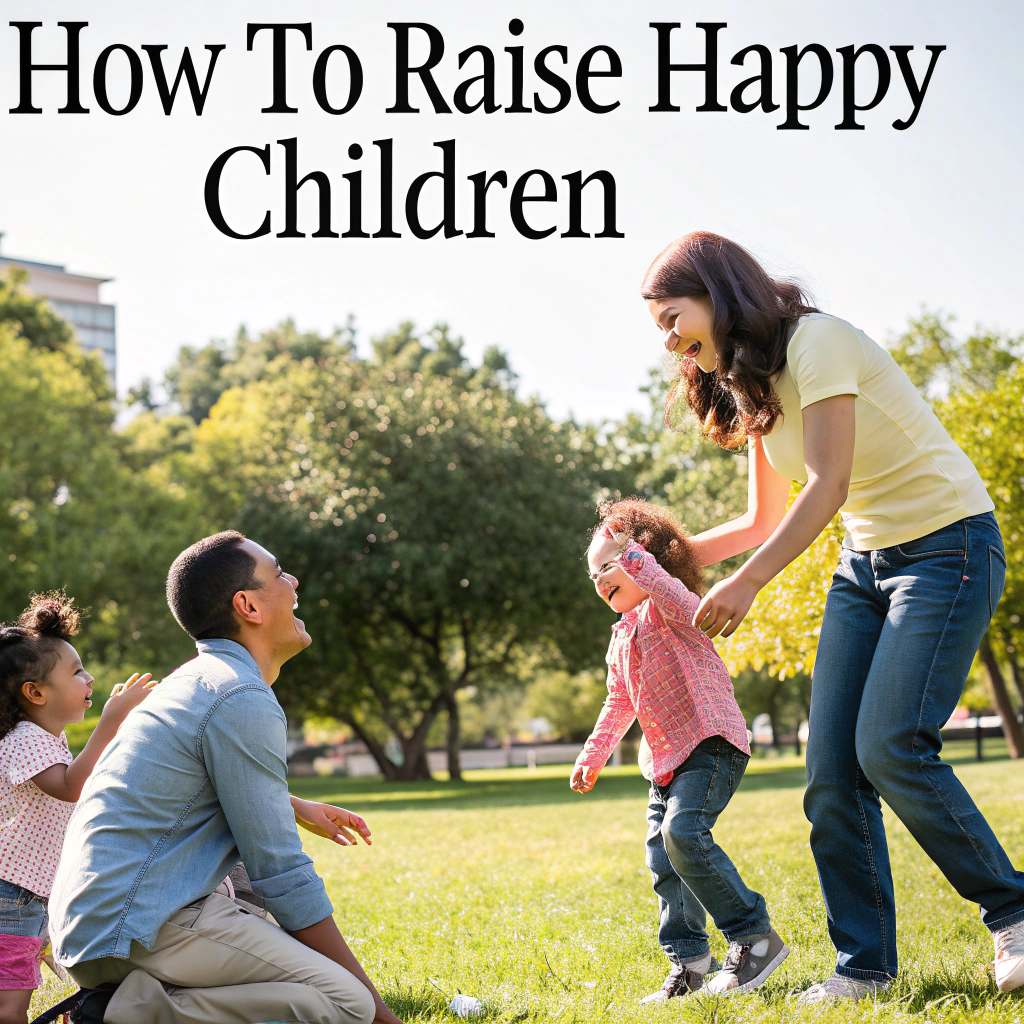Raising happy children is a goal many parents strive for, yet it can sometimes feel challenging in today’s fast-paced world. So, how can you ensure that your child grows up to be joyful, confident, and emotionally healthy? How to raise happy children involves more than just providing for their physical needs. It requires a thoughtful approach to their emotional well-being, guidance in building positive relationships, and creating an environment that fosters their happiness. In this guide, we’ll explore effective strategies and tips to support your child’s happiness, helping them navigate life with a smile.
Understanding the Importance of Happiness in Childhood
Happiness in childhood isn’t just about having fun—it’s about emotional and mental health. When children are happy, they are more likely to grow up with positive self-esteem, better mental health, and the ability to navigate life’s challenges. How to raise happy children is an essential question, as studies show that happy children tend to have better academic performance, stronger social skills, and a greater sense of empathy.
By fostering happiness in early childhood, you equip your child with the emotional tools they need to thrive later in life. It’s not about creating a perfect life but helping children develop the skills to deal with life’s ups and downs.
How to Raise Happy Children: Creating a Positive and Supportive Home Environment
A supportive and loving home is one of the key factors in raising happy children. Children need to feel safe and valued in their environment to grow emotionally. A positive home environment promotes happiness, as it gives children the security they need to explore the world with confidence.
Steps to Raise Happy Children Through a Positive Home Environment:
- Physical affection and emotional warmth: Hugging, praising, and expressing love regularly helps children feel secure and loved.
- Encouraging positive communication: The way you speak to your child influences their emotional well-being. Use kind, supportive language that nurtures their self-esteem.
- Make time for quality interactions: Spending undistracted time with your child reinforces your bond and strengthens their sense of belonging.
- Creating a peaceful atmosphere: Minimize negativity, stress, and conflict at home to ensure that your child grows up in a calm, supportive environment.
These actions are crucial for raising happy children, as they establish a stable and secure emotional foundation.
Effective Communication: A Key to Raising Happy Children
To raise happy children, fostering open and honest communication is essential. When children feel that they can express their feelings without fear of judgment, they develop strong emotional intelligence and trust in their caregivers. How to raise happy children often comes down to how well you connect and communicate with them.
Tips for Raising Happy Children Through Effective Communication:
- Encourage emotional expression: Ask your child about their day, their feelings, and what they’re thinking. Show genuine interest in their responses.
- Practice active listening: Pay close attention when your child speaks. Reflect back what they say to show you are truly engaged in their emotions.
- Validate their emotions: Acknowledge that their feelings are real, even if they seem trivial. This helps them feel understood and valued.
- Teach emotional vocabulary: Helping your child name their emotions can aid in emotional regulation and improve their ability to communicate effectively.
Good communication fosters emotional health, which is key to raising happy children.
How to Raise Happy Children by Encouraging Independence and Confidence
Part of raising happy children is teaching them to be confident and independent. When children feel capable of handling tasks on their own, they develop a sense of accomplishment and self-worth. This sense of competence is directly linked to happiness and emotional well-being.
How to Encourage Independence and Confidence in Your Child:
- Give your child responsibilities: Let them take on small tasks, like picking out their clothes or feeding the pet, and praise their efforts.
- Allow them to make choices: Whether it’s choosing what to wear or deciding how to spend their free time, giving children options boosts their autonomy and confidence.
- Support problem-solving: When challenges arise, guide your child to find solutions on their own, instead of giving them the answers immediately.
By encouraging independence, you empower your child to feel confident, which directly contributes to raising happy children.
The Role of Play and Socialization in Raising Happy Children

Play is a vital component in raising happy children. Through play, children learn how to interact with others, express themselves, and cope with emotions. Play fosters creativity, empathy, and problem-solving skills. Socialization, whether through playdates or group activities, is equally important in helping children develop the skills they need to form meaningful relationships.
How to Foster Play and Socialization for Happy Children:
- Promote both structured and unstructured play: While games with rules teach discipline, free play allows children to exercise their imagination and creativity.
- Encourage social interaction: Set up playdates or group activities where your child can interact with peers, practice sharing, and navigate social dynamics.
- Use play to teach empathy: Engage your child in role-playing games that help them understand others’ perspectives and emotions.
Playtime is not only fun but essential in raising happy children by fostering emotional and social development.
Teaching Resilience: An Essential Part of Raising Happy Children
One of the most important aspects of raising happy children is teaching them resilience—the ability to bounce back from setbacks. Resilience helps children maintain a positive outlook, even when they face difficulties. Instead of shielding your child from challenges, help them develop the tools they need to navigate obstacles.
Ways to Teach Resilience and Raise Happy Children:
- Model resilience: Show your child how you cope with challenges in your own life. Whether it’s dealing with work stress or a personal setback, your response teaches your child how to handle adversity.
- Praise effort, not just results: Encourage your child to persist through challenges, focusing on their effort rather than the outcome. This fosters a growth mindset.
- Teach problem-solving: Guide your child in coming up with solutions to challenges, and allow them to experience the satisfaction of overcoming obstacles.
Resilience is an invaluable skill in raising happy children as it equips them to handle life’s difficulties with confidence.
How Parental Involvement is Crucial in Raising Happy Children
Active parental involvement plays a significant role in raising happy children. Children who feel supported and engaged by their parents tend to perform better academically, socially, and emotionally. Your involvement shows them that they matter, and it provides them with the encouragement and resources they need to succeed.
How to Stay Involved in Raising Happy Children:
- Attend their activities: Participate in your child’s school events, extracurricular activities, and hobbies to show that you care about their interests.
- Help with homework and projects: Offer support during study time, but also encourage your child to complete tasks independently.
- Provide emotional support: Be there for your child when they face challenges, whether it’s a tough test or a social issue with friends. Your support strengthens their confidence and emotional resilience.
Parental involvement strengthens the bond between you and your child, which is essential in raising happy children.
Setting Healthy Boundaries to Foster Security and Happiness
While affection and support are vital in raising happy children, setting clear boundaries is equally important. Healthy boundaries provide children with structure, security, and a sense of what is acceptable behavior. Children who understand and respect boundaries are happier because they feel safe and know what to expect.
Tips for Setting Healthy Boundaries and Raising Happy Children:
- Be consistent with rules: Establish clear rules and expectations for behavior, and enforce them consistently. Consistency helps children feel secure.
- Use positive discipline: Instead of harsh punishment, guide your child to understand the consequences of their actions. Encourage learning from mistakes.
- Offer choices within limits: Giving children options within a set structure helps them feel empowered and capable of making decisions.
By setting boundaries, you create an environment where children feel secure, which contributes to their happiness.
Conclusion
How to raise happy children isn’t a one-size-fits-all approach, but by focusing on key principles—creating a positive home, encouraging open communication, fostering independence, promoting play, teaching resilience, and maintaining parental involvement—you can help your child develop into a confident, resilient, and joyful individual. Happiness in childhood is the foundation for success and emotional well-being in adulthood, and as a parent, you play a crucial role in nurturing it.

